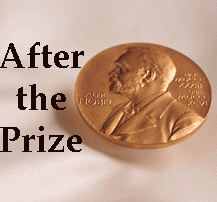

Like a feted first novel, the prize is a tough act to follow. Young winners must struggle to break new research ground while juggling the demands of celebrity and living their lives in a spotlight. Often, they've failed to live up to other people's great expectations. Some have even become severely depressed as a result.
But when these UW laureates won the prize, their ages ranged from 67 (Dehmelt) to 83 (Hitchings). By that time, all were renowned in their fields and secure in their work. Previous awards had already recognized their research, and they were juggling more demands to travel and speak than they could fulfill. For them, winning the Nobel Prize was like the icing on a cake. Their busy lives became busier, but the change was manageable.
Interestingly, Nobel didn't originally conceive of the prize as the icing on anyone's cake. Rather, he meant it to provide "such complete economic independence for those who by their previous work had given promise to further achievement that they could ever afterward devote themselves entirely to research."
Still, Nobel lived in a quite different time, when there was no substantial institutional support for research, and experiments cost much less.
Our laureates say they face competing demands to, say, keynote a scientific conference, meet European royalty, hobnob on a talk show, speak at an Ivy League college commencement, or talk to students at a local elementary school.
Most of them say they choose which requests to honor based on a commitment to their local community--and an inverse correlation with status. They favor local schools and service clubs over prestigious universities.
"The big universities have plenty of occasions to hear people like us, but the schools and junior colleges usually don't," says Fischer, proudly displaying the brightly colored thank-you notes that elementary students had sent him.
"I enjoy the chance to touch young people's lives," he added. "It gives me an opportunity to relate to kids and tell them what science is and put it in a context that they can understand."
"Too often, young students seem to believe that Nobel laureates must be beyond their understanding," says Rodbell. "With me at least, these notions are generally disposed of. I hope to instill into students the idea that scientists are normal individuals with keen interests in learning about the nature of the living process and need not have extraordinary intelligence, capabilities, or privileges."
Krebs agrees: "Often discoveries and prizes come about through a bit of luck. Face it. You don't necessarily possess great wisdom, no matter what people may expect."
At the end of the interviews, we found that there is indeed a rich life after the Nobel Prize--but it isn't that much different from what came before. Our laureates were charming, surprisingly accessible, and seemingly unconcerned with prestige. They said winning the prize hadn't changed their relationships with colleagues, family or friends.
"Who wants to be treated like a god?" asks Dehmelt. "It's too strenuous." *
Rebecca Hughes is a free-lance writer in medicine and managing editor of the on-line medical service Personal Health Connections.
George Hitchings, 1988 Prize in Medicine
Hans Dehmelt, 1989 Prize in Physics
E. Donnall Thomas, 1990 Prize in Medicine
Edwin Krebs, 1992 Prize in Medicine
Edmond Fischer, 1992 Prize in Medicine
Martin Rodbell, 1994 Prize in Medicine
Return to the Beginning of "After the Prize"
Send a letter to the editor at columns@u.washington.edu.